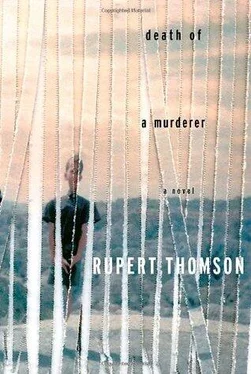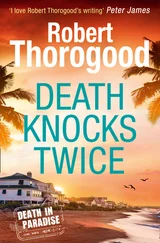“Get out of here,” the old man said.
Billy lowered his voice. “You’re a child-molester, McGarry. You’re a paedophile, a kiddy-fiddler. You’re a nonce.” He could feel all the words lining up now, ready to spill; he was almost smiling at how straightforward it was. “Do you know what happens to people like you in prison? Your life’s a misery from the second you wake up to the second you go to sleep — if you dare to go to sleep, that is. You’ll be praying for sleep, but you won’t want to risk it. Because of what might happen while you’re not looking. Sooner or later, everybody in there will find out what you are. The screws will see to that. Do you know what they do to people like you?”
“There aren’t any people like me,” the old man shouted hoarsely.
My God, Billy thought. He must have run through this scene a hundred times, but he had never imagined such defiance. For a moment, the room whirled, a surreal merry-go-round of horses, books, and silver cups. He walked over to the window and parted the curtains. The street was quiet. Hardly any lights on in the houses opposite. Nobody about.
“This is a nice area,” he said, still looking through the window, “but I’m not sure how much longer you’re going to be able to live here.”
He had the eerie feeling that the old man might be about to attack him with a blunt object, and he quickly faced back into the room. Though McGarry’s mouth was twitching and the skin under his eyes had turned a mottled whitish-grey, he was motionless, seeming to hang in the middle of the room, as if suspended, and Billy was reminded briefly of the incident in Weston Point, the wild arcs of the walking stick, the bits of glass showering through the air.
“Everyone’s going to find out what you did,” Billy said, his voice still even, calm, “and when that happens, the past will count for nothing. All this”—and he glanced round at the paintings, the trophies—“all this will turn to shit. You’ll be the scum of the earth from that point on — for ever. Your good name, if you’ve got one, will be dragged through the mud. The newspapers will take care of that.
“Even if you’re proved innocent — which is a verdict I can’t see myself — they’ll never believe it,” and he angled his head towards the bay window behind him, “not out there. The people out there will make your life hell because, for them, there’s nothing worse than somebody like you.” He paused. “No, not hell,” he said. “Much worse than that.”
“You can fuck right off.” McGarry spat the words in his direction. “Fuck off out of here.”
Billy felt an irresistible force propel him across the room until he was so close to the old man that he could smell the wet-hay smell of his breath.
“I don’t think you’ve been listening to me, McGarry,” Billy said through gritted teeth. “I’m going to have you. You’re going to fucking pay.” And he gave the old man a shove in the chest.
McGarry toppled backwards into his armchair. “That’s assault,” he said, but his voice had lost all its power.
“Well,” Billy said, “you should know.”
He was still standing over the old man, but the old man stared right through him. The dark-red dressing-gown had fallen open, revealing a triangle of thin, translucent skin, the white of the breastbone almost visible beneath.
“I don’t feel very well,” the old man said.
Billy left the room. Unlocking the front door, he let himself out. McGarry would never admit his own guilt. He was incapable of that. Still, at least someone had told him the truth…Billy stood under a streetlamp and checked his watch. He had been in the house for just eleven minutes.
He set off down the hill. The night smelled of the river. Above a cluster of black trees, the moon looked thinner, sharper. Climbing into his car, he fitted the key in the ignition. His actions felt heightened but claustrophobic; if he moved his hand, it seemed to leave staggered versions of itself in the air behind it.
After Heswall, he saw a farm off to the left. Dark windows, nobody awake. Parking his car, he walked until he found some bags of silage piled in the corner of a field. He began to hit the nearest bag, his fists slamming into the shiny plastic. He carried on punching until his arms felt slow and heavy, then he stood back, panting. There was a breeze now, and it had brought clouds with it. He waited for his breathing to calm down, then returned to his car and drove away.
When he had left the Wirral, he switched the radio on. News and sport. The weather. He kept thinking he could smell rotten vegetables. At some point, maybe, the bag containing the silage had split. He took his right hand off the wheel and brought it up to his nose. Oh God, that was awful. But he’d had to release some of his frustration. McGarry, though…He still couldn’t believe the fury — the self-righteous fury — of that old man. How dare you. Fuck off out of here. Perhaps the fact that he had woken from a deep sleep had insulated him from the shock he might otherwise have felt at Billy’s appearance on his doorstep — or perhaps the defiance was a symptom of his fear.
Billy had been shocked by his own behaviour too. The words that had streamed out of him, the quiet, vicious threats. The air of menace. He’d been better at it than he’d imagined he would be, which wasn’t an entirely comfortable thought. In going over certain aspects of the encounter, he had to keep reminding himself that he was the one who was in the right.
He didn’t speak to Venetia for more than a week. He couldn’t decide how much to tell her, what to say. When he finally called, her voice sounded smaller than usual, and flatter, and he knew right away that something had happened. She had some strange news, she said. Her father had died.
“What?” he said. “When?”
“I just heard.”
She didn’t say when exactly the death had occurred, and he didn’t ask.
Still holding the phone, he looked out of the window. A woman was wheeling a pushchair down the middle of Frederick Street. Her child was clutching a brightly coloured plastic windmill, and Billy heard the spokes revolving in slow-motion, the sound as weighty and liquid as a helicopter’s rotor blades. He felt as if his head might float backwards into the room, leaving his body where it was.
“Well,” he said at last, “I suppose it’s what you wanted…”
Venetia didn’t answer.
“Isn’t it?” he said.
“I don’t know.”
“You don’t know? Listen, I’m at home. Could you come over?”
“No. There’s too much going on. The funeral…”
Frederick Street was deserted now. Turning away from the window, Billy stared out across his living-room. “Do you need anything?”
“Don’t call me again,” she said.
They didn’t see each other for several weeks. At work, he seemed to be waiting for something without necessarily knowing what that something was. People kept asking him if he was ill. Once, he went to the pub on Paradise Street with Neil, but Venetia wasn’t there.
“Remember the last time we came here?” he said.
Neil nodded. “I only had two pints. I had to leave early.”
“There was an Indian girl sitting behind you.”
“Indian girl?” Neil looked blank.
On the pretence of visiting the Gents, Billy checked the bar on the first floor. It was empty, but he saw that they had bought a new black ball for the pool table. He cupped it for a moment in his hand, then sent it rolling slowly down the table. He watched as it rebounded off the far cushion with a noise that was like a soft full stop.
Then, one evening, his bell rang, and when he opened the door she was standing on the pavement. He knew that a long time had gone by because he didn’t recognise anything she was wearing. The lemony gleam she used to have had faded: her skin looked dry, and slightly dusty. He asked her in. Upstairs, he offered her a beer — it was all he had — but she shook her head. She’d stopped drinking, she told him.
Читать дальше












